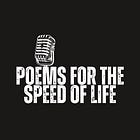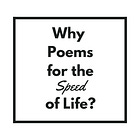S4, E1: "Christmas Trees" by Robert Frost
The first episode of the new series of Poems for the Speed of Life, on the theme of Christmas.
Welcome to another episode of Poems for the Speed of Life with Shane Breslin, entrepreneur, writer and poetry advocate.
This is the first episode of a new series of the podcast, poems on the theme of Christmas.
If you’d like to read along while you listen, you can find “Christmas Trees” by Robert Frost here
Commentary on “Christmas Trees” by Robert Frost
Robert Frost is often held up as one of the greatest of all American poets of the 20th century. Certainly he is one of the poets whose work is most fondly remembered. In earlier episodes of this podcast, I’ve read here his two most famous poems, “Stopping by Woods on a Snowy Evening”, all the way back in Episode 4, and “The Road Not Taken”, in Episode 137.
I was reading some stories about the history of “Stopping by Woods on a Snowy Evening” which led me to this poem. Christmastime was, in the Frost family, an event without equal. Anticipation, according to Frost’s daughter Lesley, began as early as October each year, and Christmas Eve and the dawn of Christmas morning were the most magical and most cherished of all moments.
This poem, “Christmas Trees”, began life in around 1915 as a Christmas circular letter, a practice Frost had of including a new poem in a Christmas letter to friends and family. We read it now, more than 100 years on, but there is much here that’s absolutely relevant for us too. The sense, which will surely be familiar to environmentalists and to all those who are unhappy with the way the urban, the capitalist, the market economy extracts value from the land. Frost’s gorgeous way of putting this, in his poem, is by drawing a stark dividing line between “city” — urbane, prosperous, driven by market forces — and “country”, where things move more slowly, where value is derived from things other than dollars and cents. And from that through his visitor, a trader or businessman who has seen in the trees on Frost’s land an opportunity:
He proved to be the city come again To look for something it had left behind
And yet — and this is where the poem, to me at least, becomes great — this is not a simple conversation. It is not straightforward for Frost to say, thanks, but no thanks. He does a great job of outlining the inner conflict he feels.
He writes,
Yet more I’d hate to hold my trees except
As others hold theirs or refuse for them,
Beyond the time of profitable growth,
The trial by market everything must come to.
He admits here that the “the trial by market” must come to everything. In this there is a duplicitous tone. There is a tone of regret that this is the case, yes, and even resistance. But there is also a tone of acceptance. He hates the thought of letting the trees live and die without allowing them to give someone somewhere some of the joy they will certainly bring.
I dallied so much with the thought of selling.
he says.
So much that he walked the land with the businessman, and entertained the conversation about the trade, but then, when talk got down to brass tacks, he knew he could not do it.
He knew he would prefer to give the trees away than to sell them for such a pittance and allow middlemen along the way to take a grubby cut. And the price to be paid was not just the price in dollars and cents. It was the price of destruction, of bareness, of the terrible blank pillaged hillside the cut trees would leave behind.
And he finishes with the wish that he it could be possible to send one of his Christmas trees, Christmas trees he didn’t know he had, with the letter as a hallmark of his goodwill.
And yet, strangely — and I’m thinking somewhere deep within Robert Frost knew this too. He has, of course. He has enclosed the trees with his letter, in the shape of these words, in the form of this poem, in the pictures it creates in our minds and the feeling it brings to our hearts.
Thank you again for listening to Poems for the Speed of Life. I’ll be back soon with another poem in this series, the Christmas series, where I am trying to introduce you the listener, wherever you are in the world, to some of the writers who have masterly managed to capture things that are almost impossible to capture, the feelings of goodness and peace and love that this time of year brings to our families and our friendships and our hearts and our minds.
See you next time on Poems for the Speed of Life.
The Christmas Series
This is a poem from the Christmas poems series of Poems for the Speed of Life.
I know there are listeners and followers of this podcast all over the world. I know that there are many people here with many different religions, and many different faiths — or none — and I know that Christianity is just one.
If a series about Christmas leaves you in any way cold or distant, let me say that the goal of this series of the podcast is not to evangelize about Christianity, nor to show the benefits of one way of being or thinking or believing at the expense of all the others.
What it is, though, is my attempt to create something that captures something of the goodness of this time of year.
Because when I think of Christmas, and when I put aside all the dogmas of us-versus-them religion, and when I put aside the mass consumerism of the so-called “shopping season”, and when I really think of this time of year, of these few weeks each December, what I think, and what I feel, is captured in one or two words.
Goodness. Love.
When you’re about on the streets at this time of year — and yes, I’m probably talking about Europe, or the Americas, or the other places that might be part of so-called “Western Civilization” or the “Western Hemisphere” — there is something always good in the air. It is something that contains magic.
It is communal. It is generous. It is kind.
It is goodness.
It is love.
And maybe — for who am I to have any certainty about what is and what isn’t? — maybe it is God’s love, maybe it is the love of Christ, that comes to us and through us at this time of year.
Whatever it is, it is a love and a goodness that never — not in my experience anyway — comes fully through the giving or receiving of gifts, but arrives in the space between. In a quiet moment. In the look in a loved one’s eye or some fleeting moment on the street or at work, when something passes unsaid, something that remains unsaid because we might not have the words to say it, but is still somehow completely understood.
And so, this series of the podcast will include poems, and some other pieces of writing, that touch on this. Poems and passages of writing that actually do find the words that capture some of that wonder and magic. Some of that invisible spirit.
Some of that goodness. And some of that love.
Long-time listeners will know that I sometimes broaden my definition of what a poem is to include in Poems for the Speed of Life.
Sometimes I offer song lyrics, as in “The Best Day of My Life” by Tom Odell in Episode 30, “The West Coast of Clare” by Andy Irvine in Episode 45, and “The Living Years” by Mike Rutherford, in Episode 2 of the recent Fatherhood poems series.
I will do that again in this series, with a song written by an Irishman who said he has written dozens of — in his words — “dreadful maudlin songs”, but that this one came to him from somewhere else, some other place, some unseen but always present source of creativity.
Sometimes I offer sections of prose that, to me, carry all the power of poetry, like “Desiderata” by Max Ehrmann in Episode 165 and a passage from Vaclav Havel’s “Hope” in Episode 187.
In this series I will include, again, the long prose poem by Dylan Thomas titled “A Child’s Christmas in Wales” and the series will also feature a segment from “A Christmas Carol” by Charles Dickens, which, no matter how good and how memorable all the various movie adaptations might be, stands above them all as a peerless work of writing. I aim to read both Dickens and Thomas every December in any case, and here I will read them for you.
I will read a newspaper editorial published in the 1890s, and I will also, of course, read poems — by an English poet laureate, by a late great Irish poet, by several Americans, dead and alive, and by others, from elsewhere around the world.
This series is for everyone.
It’s for everyone who might want or need to feel some of this goodness and some of this love, especially in our world which sometimes seems like it’s in short supply of both.
It will be for everyone who wants to give generously, and not just in material or monetary ways, but in the generosity of spirit and consciousness and goodwill that will always be useful, and cherished, by the people you come into contact with.
I look forward to bringing you the new series of Poems for the Speed of Life, on Christmas, starting with Episode 1, on Saturday, November 23rd and continuing through December 2024.
Thank you for listening. If you’re not already subscribing or following, please do so, for free, in your podcast app or in Spotify. Keep an eye on your podcasts feeds, and you’ll be hearing from me again very soon.
See you soon.
For a detailed outline of the mission and purpose behind this podcast, please check out these two episodes:
If you’re on social media, you can follow on Instagram here and Facebook here.
You can subscribe to or follow the show for free wherever you listen to podcasts.
To leave the show a review:
On Spotify. Open the Spotify app (iOS or Android), find the show and tap to rate five-stars.
On Apple. Open your Apple Podcasts app, find the show and tap to rate five-stars.
On Podchaser. Open the Podchaser website, find the show and tap to rate five-stars.









